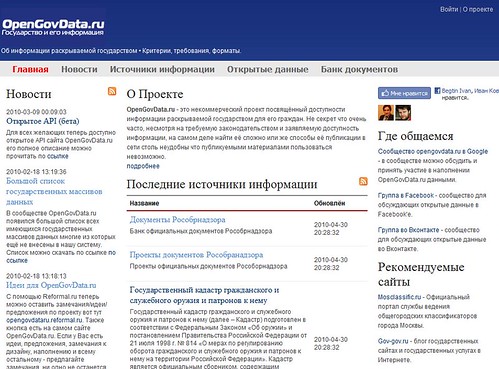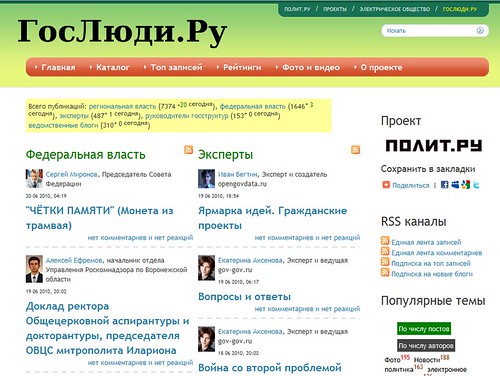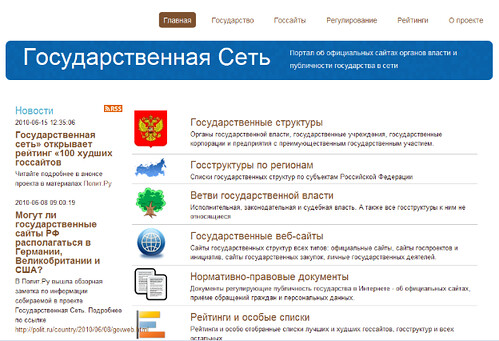The following guest post is from Ivan Begtin, who is a member of the Open Knowledge Foundation‘s Working Group on Open Government Data.
I would like to give a brief overview of a few projects I have been working on related to open government data in Russia.
OpenGovData.ru
The first is OpenGovData.ru, which is a private non-profit initiative to collect all Russian public government datasets in one place.
There are now about 288 public datasets listed as “data sources”, 5 datasets published as structured data and 33 documents that regulated information openness and public datasets collected.

Also we have an Opengovdata.ru Google group to coordinate Russian open data activities. And all data is provided with a public API described here:
Goslyudi.ru (Government People)
This project was inspired by projects like Politwitter.ca (Canada) and Twittcongress.org (US). The only Russian difference was that most of Russian politicians prefer to use Livejournal.com as blog hosting.
So we decided to create website that should aggregate all posts from all blogs of any government related person: representative, official, governor, member of the government, major person of government corporation and government unitary enterprises.

As result new website aggregates about 238 blogs of government people.
We created lot’s of ratings like:
- Talkativity rating
- Readers rating
- Rating of regional activities
And one special rating – ant-rating. We collected list of “government blogs” which are not blogs at all. Without RSS, without any change to leave a comment, without any other blog attribute but named “blog”.
And if you’re interested there is a public API available here!
GovWeb.ru (Government Web)
About year ago Russian government published new federal law, codename “8-FZ” that regulated all existing official government websites. This law isn’t very technical or to be honest not detailed enough but It announced a few major requirements.
One of them is requirement for government bodies to be owners of domains of their websites. In same time here in Russian most government officials even don’t know how many government bodies and official websites ever exists.
So A few weeks ago we announced new project – Government Web. I am project manager/coordinator and creator of this project. It was also sponsored by Russian news magazine and website Polit.ru.
Goal of this project is to create full catalog of all government bodies and any type of government websites which we developed as part of government activities. It includes:
- Official websites of government bodies
- Websites of Federal Targeted Programs
- Official government initiatives and projects websites
- Government procurement portals
- Government e-Services websites
- And so on. About 12 types total

We collected information about technologies used for government websites development, regulative documents, WHOIS data about domain owners. Also we validate each website against W3C validator and collect information about it’s errors and warnings. It helps to create ratings of websites.
Right now we already collected information about:
- 2762 government bodies
- 2133 government websites
- 19 regulative documents
Also during building this system we have found lot’s of “anomalies” which we grouped as “special lists”.
For example, we found following information:
- 108 domains of government websites registered by private persons. Since where is not Russian law that demands government bodies to have websites at .gov.ru domain and Russian law allows private persons to own domains, we have this situation. Full list here.
- 172 domains of government websites registered on private companies. Most of them are website developers that “forgot” to transfer domain to government body. Full list here.
- 30 government websites hosted outside Russian boundaries. Full list here.
- 25 government websites hosted on free hostings like Russian hostings UCoz.ru and Narod.ru. Full list here.
- 109 domains of government websites are not in .ru zone. Full list here.
None of this is currently regulated by Russian laws.
What next?
Each project has it’s own future.
For OpenGovData.ru – it will grow, it will be prepared for Linked Data. And, sure, it could be very interesting to make it compatible with other public data catalogs like the OKF’s CKAN project.
For Government People – it will grow too, we will add more stats, more info about government persons, more API and so on
For Government Web – we are going to complete building of the catalog and we predict that it will have about 10,000 government websites at the end.
At the same time we are going to add more information about RSS feeds, open data, data copyrights, availability of websites for mobile users and people with disabilities.
As one of the steps to make this information even more public we are going to provide public API as part of this project.
This post is by a guest poster. If you would like to write something for the Open Knowledge Foundation blog, please see the submissions page.









How to start working with Russian resource around e-government, Open Government, Open Data, Linked Data. Great job!
Would love to learn more about RSS feeds. I am so confused between Twitter, Facebook and Blogs. Much to learn. Thanks.